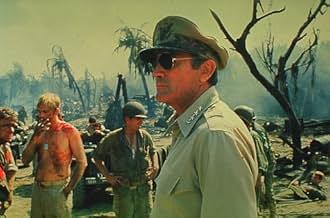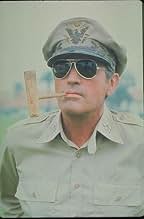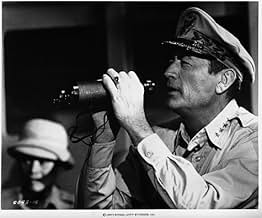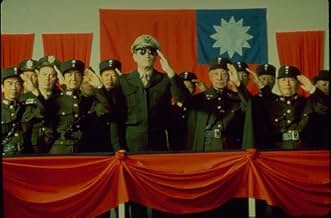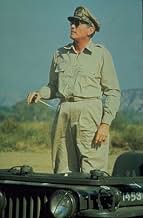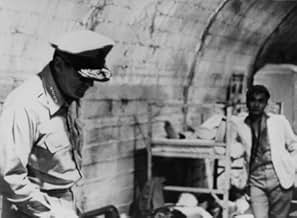Il generale MacArthur, una figura carismatica e allo stesso tempo complessa, dai trionfi alle sconfitte della sua brillante carriera dal 1942, nelle Filippine, al 1951 fino al suo ritorno al... Leggi tuttoIl generale MacArthur, una figura carismatica e allo stesso tempo complessa, dai trionfi alle sconfitte della sua brillante carriera dal 1942, nelle Filippine, al 1951 fino al suo ritorno alla guerra, in Corea che portò al suo allontanamento dall'esercito.Il generale MacArthur, una figura carismatica e allo stesso tempo complessa, dai trionfi alle sconfitte della sua brillante carriera dal 1942, nelle Filippine, al 1951 fino al suo ritorno alla guerra, in Corea che portò al suo allontanamento dall'esercito.
- Premi
- 2 candidature totali
- Admiral King
- (as Russell D. Johnson)
Recensioni in evidenza
One difference between the two films is that `Patton' is more focused, concentrating on a relatively short period at and immediately after the end of the Second World War, whereas `MacArthur' covers not only this war but also its subject's role in the Korean war, as well as his period as American governor of occupied Japan during the interlude.
The main difference, however, lies in the way the two leaders are played. Gregory Peck dominates this film even more than George C. Scott dominated `Patton'. Whereas Scott had another major star, Karl Malden, playing opposite him as General Bradley, none of the other actors in `MacArthur' are household names, at least for their film work. Scott, of course, portrayed Patton as aggressive and fiery-tempered, a man who at times was at war with the rest of the human race, not just with the enemy. I suspect that in real life General MacArthur was as volcanic an individual as Patton, but that is not how he appears in this film. Peck's MacArthur is of a more reflective, thoughtful bent, comparable to the liberal intellectuals he played in some of his other films. At times, he even seems to be a man of the political left. Much of his speech on the occasion of the Japanese surrender in 1945 could have been written by a paid-up member of CND, and his policies for reforming Japanese society during the American occupation have a semi-socialist air to them. In an attempt to show something of MacArthur's gift for inspiring leadership, Peck makes him a fine speaker, but his speeches always seem to owe more to the studied tricks of the practised rhetorician than to any fire in the heart. It is as if Atticus Finch from `To Kill a Mockingbird' had put on a general's uniform.
Whereas Scott attempted a `warts and all' portrait of Patton, the criticism has been made that `MacArthur' attempts to gloss over some of its subject's less attractive qualities. I think that this criticism is a fair one, particularly as far as the Korean War is concerned. The film gives the impression that MacArthur was a brilliant general who dared stand up to interfering, militarily ignorant politicians who did not know how to fight the war and was sacked for his pains when victory was within his grasp. Many historians, of course, feel that Truman was forced to sack MacArthur because the latter's conduct was becoming a risk to world peace, and had no choice but to accept a stalemate because Stalin would not have allowed his Chinese allies to be humiliated. Even during the Korean scenes, Peck's MacArthur comes across as more idealistic than his real-life original probably was; we see little of his rashness and naivety about political matters. (Truman 's remark `he knows as much about politics as a pig knows about Sunday' was said about Eisenhower, but it could equally well have been applied to MacArthur's approach to international diplomacy). Perhaps the film's attempt to paint out some of MacArthur's warts reflects the period in which it was made. The late seventies, after the twin traumas of Vietnam and Watergate, was a difficult time for America, and a public looking for reassurance might have welcomed a reassuringly heroic depiction of a military figure from the previous generation. Another criticism I would make of the film is that it falls between two stools. If it was intended to be a full biography of MacArthur, something should have been shown of his early life, which is not covered at all. (The first we see of the general is when he is leading the American resistance to the Japanese invasion of the Philippines). One theme that runs throughout the film is the influence of General MacArthur's father, himself a military hero. I would have liked to see what sort of man Arthur MacArthur was, and just why his son considered him to be such a hero and role model. Another interesting way of making the film would have been to concentrate on Korea and on MacArthur's clash with Truman, with equal prominence given to the two men and with actors of similar stature playing them. The way in which the film actually was made seemed to me to be less interesting than either of these alternative approaches.
It would be wrong, however, to give the impression that I disliked the film altogether. Although I may not have agreed with Peck's interpretation of the main role, there is no denying that he played it with his normal professionalism and seriousness. The film as a whole is a good example of a solid, workmanlike biopic, thoughtful and informative. It is a good film, but one that could have been a better one. 7/10.
On a pedantic note, the map which MacArthur is shown using during the Korean War shows the DMZ, the boundary between the two Korean states that did not come into existence until after the war. (The pre-war boundary was the 38th parallel). Also, I think that MacArthur was referring to the `tocsin' of war. War may be toxic, but it is difficult to listen with thirsty ear for a toxin.
Of course no movie, not even at 130 minutes, can capture all of a man's professional history, but the lacunae here are convenient ones. The upshot is that this is like one of those John Singer Sargent portraits of society women that made them look sexier and prettier than they probably were.
For instance, MacArthur remarks somewhere along the line that his casualties are fewer than anyone else's (or something like that) when in fact those figures have been contested. MacArthur's aching desire to invade China is turned into a kind of a joke, when he complains that he is only allowed to bomb the southern entrances to bridges across the Yalu River -- "In all my career, I've never learned how to bomb HALF A BRIDGE." Very amusing. But then his political views as a whole, which were somewhere to the right of Attila the Hun's, are skipped over. His run for president fizzled because not even the most rabid anti-communist power broker wanted a war with China, but this too is turned into a morbid joke, when MacArthur remarks to his wife about the newly elected Eisenhower -- "He'll make a great president. He was the best clerk I ever had." (Eisenhower's joke appears elsewhere -- "I spent seven years under MacArthur studying dramatics.") The most illustrative revelation of MacArthur's character isn't in the film. MacArthur recruited Weldon E. Rhoades as the personal pilot of his B-17 and the aviator became a loyal disciple and sometimes personal confidant. By Rhoades' own admission, "this meant that the general would talk for great lengths of time during which Rhoades was not expected to respond."
One last point that is glossed over. MacArthur is stuck on the island of Corregidor in the Philippines surrounded by Japanese but prepared to fight it out. He is ordered to return to Australia on PT boats. He objects strenuously but in the end obeys his orders and retreats. It's a dangerous voyage on small worn-out boats made of plywood. And for this he is awarded the medal of honor. The officers and men of that handful of boats made the same voyage -- round trip too -- and no medals of honor for them, although they were acting under the same conditions, following orders. (An aside: the bar is a little lower for high-ranking officers, which is why their dress uniforms seem to droop with decorations like some Latin American dictators'.)
But it's not a bad movie, as long as you're looking for a heroic picture of an undoubtedly heroic man. Gregory Peck exudes his usual sincerity and is a much more effective speaker than MacArthur himself who almost always sounded like a blowhard. And Peck had to do quite a good job to overcome that florid prose -- "Still, I listen with thirsty ear for the tocsin call," etc. ("Thirsty ear.") In a speech at West Point McArthur also misattribues a quote from Santayana to Plato ("only the dead have seen the end of war"), but that's carping.
The movie follows the same pattern as "Patton." Give us an admirable hero, one human enough to have a little fun poked at him. (Peck emerges from a shower draped in a couple of huge bath towels arranged like a toga, so that he resembles Caesar.) Surround him with devoted but sometimes puzzled subordinates who, when they are not courting his favor, are warning him that something he plans to do might be misinterpreted by the suits back in Washington. Just don't have him do anything seriously wrong.
Production values are good. This is an expensive picture. Supporting players more or less blend into one another -- there's only room for one Caesar in this movie.
Some things are left unexplained, unintentionally it would seem, since this is not the kind of movie that thrives on leaving anything up to the viewer. General Wainwright is left behind on Corregidor to surrender to the Japanese. Back in Australia, MacArthur fumes at such cowardice, Wainwright must be temporarily deranged. But when they meet again when Manila is liberated, MacArthur greets him like a long lost pal. What happened? And the big meeting between MacArthur and Truman that was supposed to iron out the differences between them? It's confusingly staged and scripted. Both sides seem to come away satisfied but, if that were the case, the satisfaction must have been based on some profound misunderstandings because afterward MacArthur and Truman both went merrily on their divergent ways.
I kind of enjoy watching it once in a while. The Irish Daniel O'Herlihy does a side-splitting impression of Franklin D. Roosevelt. And the action scenes are fairly well done. I do wish that the movie had been more honest with its subject. As it is, it's a flawed movie about a flawed but remarkable man.
George S. Patton commanded an Army formation in Europe while Douglas Macarthur commanded an entire theater of operation in the Pacific. By his own admission, Patton never had any political ambitions, while MacArthur definitely had such aspirations. Patton's political naivety made him ill-suited as the postwar occupation commander in Bavaria while MacArthur's political astuteness served him well during the occupation of Japan.
Yet both men were great, if iconoclastic military leaders. Patton's brilliant northern pivot during the Battle of the Bulge is matched by the MacArthur's daring amphibious landing at Inchon. And both men believed strongly in their destiny; Patton's belief was based on reincarnation while MacArthur was motivated by following in his illustrious father's footsteps.
Surprisingly, PATTON is the much more succinct, less ambitious film than MACARTHUR. It concentrates on its colorful, mercurial main character during a comparatively brief two-year period between the American defeat at Kasserine Pass in early 1943 to Patton's dismissal prior to his death in late 1945. Although we see Patton's conflict with Omar Bradley, Bernard Montgomery, and Bedell Smith, we never see his interaction with General Dwight Eisenhower, Prime Minister Winston Churchill, or General George Marshall, the U.S. Army's chief of staff.
MACARTHUR is a much more ambitious film, covering nearly a decade from the fall of Bataan in early 1942 to MacArthur's dismissal in 1951. Additionally, MACARTHUR shows a wider range of conflict between MacArthur and such individuals as Admiral Nimitz, General Marshall, ambassador William Averell Harriman, and Presidents Roosevelt and Harry S. Truman.
So, does MACARTHUR match PATTON as a groundbreaking biopic? No, it doesn't.
MACARTHUR lacks the insightful, acerbic screenplay that Francis Ford Coppola and Edmund North supplied PATTON. The direction by TV veteran Joseph Sargent is yeoman-like where the late Franklin J. Schaffner offers a more vigorous, hell-for-leather approach to PATTON. Both films are handsomely mounted productions that serve as a tribute to acumen of the producer McCarthy. Both movies benefit from film scores by the ever-reliable Jerry Goldsmith.
While PATTON has its main character departing in a Valhalla-like denouement, MACARTHUR is book-ended by the legendary speech that the old soldier delivered to the cadet corps at West Point in 1962 as a final valedictory.
At the heart of both films are the extraordinary performances of their lead actors. The late George C. Scott's portrayal of Patton is justly remembered, but Gregory Peck delivers a performance that is both subtle and unapologetic and helps to elevate this often-pedestrian production to a higher level. Peck's portrayal is reminiscent of his work in TWELVE O'CLOCK HIGH, but with the added weight of an additional thirty years of experience and craftsmanship that this great actor brings to bear to this role. Peck is ably supported by Dan O'Herlihy as FDR and the late Ed Flanders as Harry S. Truman.
Finally, I must note the presence of Dr. D. Clayton James, the author of the standard multi-volume biography of MacArthur, who served as this film's technical advisor.
Agreeable biopic about the famed general concerning the latter years of his long military career , it starts with his assumption of command of the Philippine army and subsequent retreat ; going on through Inchon landing , China invasion on Korea crossing over parallel 39 and his sacking by President Harry Truman . This is a pretty good film with plenty of emotion , drama , biographic elements , historical events and Peck is spellbinding in the title role . The flick describes efficiently his particular character , complexity and the controversy that surrounded him . Very fine acting by the great Gregory Peck as military chief , he even bears remarkable resemblance to Douglas MacArthur , he had some of his hair shaved off since the real General was quite bald . Peck' outstanding acting arranges to bring alive this historical role , who strode a fine line between demigod and expert battlefield commander . Originally made for TV , it has a long runtime , at 144 minutes , being cut for cinema release . The picture gets magnificent interpretations from prestigious secondaries playing Generals and historical roles such as Kenneth Tobey (Adm. William 'Bull' Halsey) , Gen. George C. Marshall (Ward Costello) , Addison Powell (Fleet Adm. Chester W. Nimitz) , Dick O'Neill (Col. Courtney Whitney) , and Presidents as Dan O'Herlihy (Franklin D Roosevel) , Ed Flanders (Harry Truman) , and John Fujioka (Emperor Hirohito) . This is an engaging warlike drama made at the better for its historic resonance and will appeal to Gregory Peck fans.
Well produced by Frank McCarthy who also financed other warfare movies such as ¨Decision before dawn¨, ¨Single-Handed¨, ¨Fireball Forward¨ and ¨Patton¨ . This solid motion picture was professionally directed by Joseph Sargent , though it holds a certain television style . Sargent is an expert on biography and specialist on historical narrations , as he proved in 'Mandela and Clerk' , 'Abraham , 'McArthur' , 'When the lions roared' which reunited to Stalin , Churchill and again Roosevelt , 'Day one' with Oppenheimer and General General Groves and 'Warm Springs' about Franklin D Roosevelt ; these films don't pack the punch that he achieved in his best movie resulting to be 'Taking of Pelham one , two , three' .
And adding more biographical elements about this military hero : MacArthur was recalled to active duty in 1941 as commander of United States Army Forces in the Far East. A series of disasters followed, starting with the destruction of his air forces on 8 December 1941, and the invasion of the Philippines by the Japanese. MacArthur's forces were soon compelled to withdraw to Bataan, where they held out until May 1942. In March 1942, MacArthur, his family and his staff left nearby Corregidor Island in PT boats and escaped to Australia, where MacArthur became Supreme Commander, Southwest Pacific Area. And General Douglas MacArthur pronounces his famous line : "I will return" . For his defense of the Philippines, MacArthur was awarded the Medal of Honor. After more than two years of fighting in the Pacific, he fulfilled a promise to return to the Philippines. He officially accepted Japan's surrender on 2 September 1945, aboard the USS Missouri anchored in Tokyo Bay, and oversaw the occupation of Japan from 1945 to 1951. As the effective ruler of Japan, he oversaw sweeping economic, political and social changes. He led the United Nations Command in the Korean War until he was removed from command by President Harry S. Truman on 11 April 1951. He later became Chairman of the Board of Remington Rand.
But all in all, I think this is a remarkably balanced look at an extremely controversial person. For those who know little about MacArthur, it's a good place to start. He was a larger-than-life figure, and in this film you can see both why he was revered and why he was despised.
Although MacArthur came of age in the 19th century and became a general in World War I, this movie focuses on his high and lows in World War II and the Korean War. During that time he was an iconic figure. "Iconic" is an overused word, but it applies to him. With his trademark hat and corncob pipe, plus his curiously old-fashioned way of speaking and his instinct for controversy, he was unmistakable and larger than life.
During the late 1970s, the post-Watergate era, traditional war pictures were no longer in vogue. "M*A*S*H," the mildly pacifist TV series set in the Korean War, treated MacArthur as a rather silly figure. But this movie, made in 1977, takes the man seriously, while showing his flaws clearly. It also is more frank than most classic films about how little consensus there is in warmaking. Leaders quarrel and connive while making policy, and the most loyal grunts are often dismayed at the decisions that put them in harm's way.
Gregory Peck is excellent in capturing the complexity of Douglas MacArthur. Peck was an outspoken political liberal, and one has to assume he was no admirer of the unabashedly right-wing MacArthur. But he takes on the man's persona admirably.
After heaping so much praise on "MacArthur," I must admit it is not great cinema. It's more interesting than moving. But if you're under 50 and know Douglas MacArthur only as a name in the history books, this will be an eye-opener. Like any good introduction to a subject, it should encourage you to seek other information and form your own opinions about the man and his times.
Lo sapevi?
- QuizAlthough Gregory Peck had reservations about the film's script and production quality, he later called it one of his favorite roles, if not one of his favorite movies.
- BlooperShortly after MacArthur's escape from the Philippines in the spring of 1942, he complains that the President and the Chiefs of Staff are not sending him enough troops, supplies, and equipment to carry on his war against the Japanese. He says that priorities are instead being given to commanders in other theaters, including Gen Patton in North Africa. However, Patton's troops did not arrive in Africa until November 1942.
- Citazioni
President Sergio Osmena: You see, General, my people are going to laugh if I fell in deep water. I cannot swim!
General Douglas MacArthur: That's not so bad, Mr. President. Everyone's about to see that I can't walk on water.
- Versioni alternativeThe UK DVD issue omits the sequence where MacArthur meets Emperor Hirohito, but instead, adds to the ending. The film now ends with MacArthur and his wife watch a TV transmission of the presidential inauguration of Eisenhower MacArthur's comment: "He will turn out fine. He was the best clerk that ever served under me"), followed by the end of MacArthur's farewell speech at West Point. The subsequent credits starts to roll slightly earlier than previously.
I più visti
- How long is MacArthur?Powered by Alexa
Dettagli
Botteghino
- Budget
- 9.000.000 USD (previsto)
- Tempo di esecuzione
- 2h 10min(130 min)
- Mix di suoni
- Proporzioni
- 1.85 : 1

